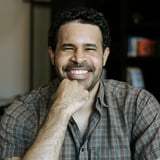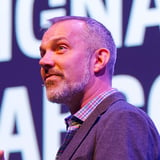Summary
The speaker acknowledges the difficulties researchers face during waves of layoffs, including personal experience with job loss, and argues that this is precisely the moment to advance research by becoming more valuable and influential within organizations. The central theme is urging researchers to evolve from merely informing decisions to actively leading change. The talk previews a series of presentations by notable figures such as Priyinal and Rita Khadri on human-centered AI innovation through qualitative and participatory research; Sarah Fatala who challenges binary views on participatory research; Scott Please on blending qualitative and quantitative approaches via mathematical models to foster organizational insight diffusion; Mamagani on preventing political theater in generative workshops; Carl Turner on frameworks to counteract organizational dysfunction; Kristen Guth on stakeholder alignment workshops; and Mike Oren on transforming research approaches akin to pharmaceutical industry models. Throughout, the speaker emphasizes the strategic position of researchers at the intersection of insight and action and calls for a reinvention of research practice to meet evolving organizational needs. The talk encourages attendees to embrace change, amplify their impact, and lead transformation within their professional contexts.
Key Insights
-
•
Layoffs in research have been recurring events, challenging continuity but also serving as catalysts for change.
-
•
Researchers must transition from informing decisions to becoming proactive organizational change makers.
-
•
Participatory research is often viewed as a binary choice, but Sarah Fatala offers a nuanced framework to expand this perspective.
-
•
Integrating qualitative and quantitative research through mathematical conceptual models can enhance insight diffusion, as Scott Please advocates.
-
•
Generative workshops like design sprints risk devolving into political theater without proper facilitation, as highlighted by Mamagani.
-
•
Frameworks for diagnosing and reviving troubled projects can address underlying organizational and cultural challenges, according to Carl Turner.
-
•
Workshops to drive clarity and align stakeholders are powerful tools for organizational change, exemplified by Kristen Guth's approach.
-
•
There is value in adopting research models from other industries, such as pharmaceuticals, for advancing research practices, per Mike Oren.
-
•
Researchers hold a unique position at the nexus of insight and action, allowing them to lead change effectively.
-
•
Moving beyond traditional research methods is essential for increasing the strategic value of research in organizations.
Notable Quotes
"This is a weird time for research. Layoffs have torn through our field."
"There's no better time to advance research than now."
"We don't just need to do a better job of articulating our value; we need to become more valuable."
"Researchers as organizational change makers is the theme for today."
"Participatory research always seems like something you're either doing or not doing — more often than not, not doing."
"What got us here won't get us where we want to go."
"We researchers have an opportunity to use our position, our orientation, and our skills to lead change."
"We're positioned at the nexus of insight and action."
"When it's done, I invite you to take the lessons learned and provocations shared back into your professional lives."
"Let's shake s*** up."
Or choose a question:
















More Videos

"Design ops is a way to care for the people who design."
Ebru NamaldiDesigning the Designer’s Journey: Scaling Teams, Culture, and Growth Through DesignOps
September 11, 2025

"We are studying experiences in ecosystems, not just products anymore."
Katie JohnsonDisrupting generative AI products with just-in-time consumer insights
June 4, 2024

"The mandala metaphor reminds us not to be emotionally attached to deliverables; sometimes you build to throw away."
Ben Reason Aline Horta Majid Iqbal Fabiano LeoniMaking the system visible: The fastest path to better decisions
November 20, 2025

"These products are often part of an ecosystem of other complex products."
Kit UngerTheme 2: Introduction
June 10, 2021

"AI tools can help synthesize large documents or conduct literature reviews to support researchers’ secondary research."
Jen Cardello Dr. Shadi Janansefat Alex WrightCurating insight: Strategies for integrating knowledge across research functions
March 11, 2025

"If patients stop using the app because they’ve got their health under control, that’s like a dating app success — they got married, not that the app failed."
Daniel J. RosenbergDigital Medicine Design
September 26, 2019

"The challenge at senior or principal IC levels is demonstrating leverage without managing a big team."
Peter MerholzThe Mysterious Case of the Missing UX Career Path
August 25, 2022

"Twitch’s streaming for six hours to hundreds of people scored 51 out of 59 on our carbon impact scale."
Tristin OldaniTurning awareness into action with Climate UX
January 16, 2025

"Design maturity dictates how much influence design has outside the design group, impacting policy, finance, and other teams' decisions."
Sarah WilliamsVerizon_A Framework for CX Transformation
January 8, 2024
















